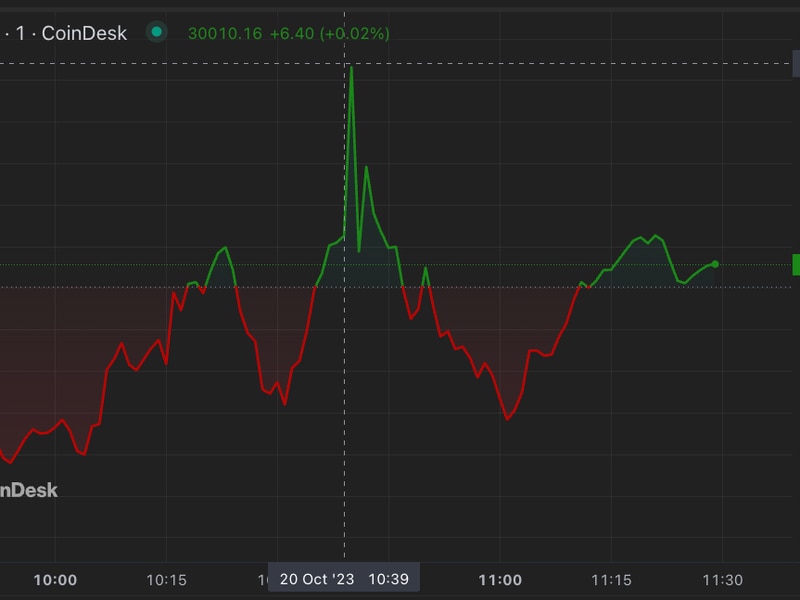U.S. SEC Poised to Move Toward DeFi Oversight As It Reopens Proposed Regulations
The U.S. Securities and Exchange Commission (SEC) may be coming for decentralized finance (DeFi) as it considers reopening a proposal from last year that would now explicitly target platforms for those crypto transactions as exchanges that need to be regulated.
The SEC proposed expanding the definition of the word “exchange” in January 2022 to capture a broader swath of trading activity in the U.S. At the time, the agency said in its proposed rulemaking that certain entities engaging in trading activity were not regulated as exchanges, creating a “regulatory disparity.”
The securities agency read last year’s comment letters from the crypto industry calling the initial proposal an overreaching power grab that failed to provide enough clarity about its meaning to be legitimate. The commission is going to vote Friday on what amounts to a response to that criticism. If approved, the updated proposal would use more direct language that includes DeFi in the widening definition of regulated exchanges, and it will detail its estimates on how much that change is expected to cost the industry.
The specific changes will be published after the meeting ends with a vote later today.
SEC Chair Gary Gensler contends that most crypto platforms are already operating as unregistered securities exchanges, with or without the latest tweaks to the definition of what it means to be an exchange. But he and the commission are poised to “reiterate the applicability of existing rules to platforms that trade crypto asset securities, including so-called ‘DeFi’ systems,” according to an SEC fact sheet outlining the changes.
“Calling yourself a DeFi platform is not an excuse to defy the securities laws,” he said in remarks prepared ahead of the meeting.
SEC officials, speaking to reporters ahead of Friday’s meeting, said the reopening and additional information came after a number of market participants asked for more information about the proposed amendments and how exactly they would be applied to crypto assets and DeFi.
The agency isn’t looking to actually define DeFi in the rule, according to SEC officials, but will evaluate each situation by how the activity is being handled, including whether there’s an intermediary and exactly what service that intermediary is providing.
In the prepared remarks, Gensler reiterated his view that “the vast majority of crypto tokens are securities” and that crypto trading platforms already meet existing requirements for securities exchanges.
“These platforms match orders of multiple buyers and sellers of crypto securities using established, non-discretionary methods,” he said. “That’s the definition of an exchange – and today, most crypto trading platforms meet it. That’s the case regardless of whether they call themselves centralized or decentralized.”
The crypto industry has long advocated for U.S. rules that can bring certainty to how the companies and activities need to operate, though prominent crypto executives and their lobbyists have also said that the SEC’s position that they need to register and follow existing securities laws won’t work for this industry. The SEC has broadly chosen against a tailored approach to the cryptocurrency sector that would acknowledge how it differs from the rest of finance, with Gensler routinely arguing that longstanding securities laws are sufficient.
The SEC had pushed this exchange-definition rule and other proposals last year that – without detailing its intentions with crypto specifically – had suggested that the agency meant to formalize its reach into the digital assets sector.
Later, the agency became more explicit about having its eyes on digital assets, when it issued another proposal in February that could bar investment advisers from keeping assets at crypto firms.
With each proposed rule, the SEC’s walls are closing in on crypto businesses that insist there’s no path for them into regulated finance.
The agency received almost 400 comment letters on this week’s revisited proposal and disclosed 35 staff meetings and calls with Wall Street lobbyists, industry self-regulatory organizations, the Bank of England and others regarding the effort. A reopened comment period would give crypto lawyers and lobbyists another 30 days to argue against the rule before the agency will review those responses and decide whether to approve a final rule.
Even when the new exchange definition didn’t name crypto explicitly, the industry opposed it with the assumption that it had digital assets platforms in mind.
“The proposal fails to adapt to – let alone acknowledge – the fundamentally new ways in which individuals can conduct asset exchanges using DeFi protocols,” the Blockchain Association and the DeFi Education Fund argued in a 2022 letter to the SEC. “Instead, it would improperly apply regulations designed for intermediating exchanges like the New York Stock Exchange to software or software developers.”
Rep. Patrick McHenry (R-N.C.), the chairman of the House Financial Services Committee that oversees the SEC, wrote a letter to Gensler with another committee member that said the agency seemed to be trying “to expand the SEC’s jurisdiction beyond its existing statutory authority to regulate market participants in the digital asset ecosystem, including in decentralized finance”
Circle Internet Financial sought the chance to ask for more specific rules for crypto.
“In view of the unique architecture of digital asset markets, we suggest that the commission would benefit the most from a wide-ranging concept release focused on digital assets markets and how best to achieve its policy goals in light of the unique architecture of such markets,” the company’s comment letter suggested.
But some were glad last year at the possibility crypto could be folded into this SEC oversight.
“The cryptocurrency industry is rapidly expanding with some industry lobbyists insisting that their offerings and platforms fall outside the securities laws and regulations,” Better Markets, a Washington-based group advocating for tougher protections in the financial system, wrote in a comment letter last year. “But clearly, the commission must apply securities regulation equally to all securities regardless of how novel, ‘innovative,’ popular, or profitable such offerings may be.”
It’s been a tough month for DeFi in U.S. policy circles, after the U.S. Treasury Department also made clear last week that DeFi services should be subject to anti-money-laundering laws, saying the platforms have been used by criminals and for terrorist financing.
Edited by Nikhilesh De.
DISCLOSURE
Please note that our
privacy policy,
terms of use,
cookies,
and
do not sell my personal information
has been updated
.
The leader in news and information on cryptocurrency, digital assets and the future of money, CoinDesk is a media outlet that strives for the highest journalistic standards and abides by a
strict set of editorial policies.
CoinDesk is an independent operating subsidiary of
Digital Currency Group,
which invests in
cryptocurrencies
and blockchain
startups.
As part of their compensation, certain CoinDesk employees, including editorial employees, may receive exposure to DCG equity in the form of
stock appreciation rights,
which vest over a multi-year period. CoinDesk journalists are not allowed to purchase stock outright in DCG
.
:format(jpg)/www.coindesk.com/resizer/BETd9o0r2OHtd2vT2ZqY9QPrJps=/arc-photo-coindesk/arc2-prod/public/ODFQHDRZFJG7XNVO7P6PUYMWS4.png)
Nikhilesh De is CoinDesk’s managing editor for global policy and regulation. He owns marginal amounts of bitcoin and ether.
:format(jpg)/www.coindesk.com/resizer/x37dWM_1ORxU2nCUG8EyVsmvF4Y=/arc-photo-coindesk/arc2-prod/public/3CZRUU6QWVDQ5PSXCNWHUB6CY4.png)
Jesse Hamilton is CoinDesk’s deputy managing editor for global policy and regulation. He doesn’t hold any crypto.
Learn more about Consensus 2023, CoinDesk’s longest-running and most influential event that brings together all sides of crypto, blockchain and Web3. Head to consensus.coindesk.com to register and buy your pass now.
:format(jpg)/www.coindesk.com/resizer/BETd9o0r2OHtd2vT2ZqY9QPrJps=/arc-photo-coindesk/arc2-prod/public/ODFQHDRZFJG7XNVO7P6PUYMWS4.png)
Nikhilesh De is CoinDesk’s managing editor for global policy and regulation. He owns marginal amounts of bitcoin and ether.
:format(jpg)/www.coindesk.com/resizer/x37dWM_1ORxU2nCUG8EyVsmvF4Y=/arc-photo-coindesk/arc2-prod/public/3CZRUU6QWVDQ5PSXCNWHUB6CY4.png)
Jesse Hamilton is CoinDesk’s deputy managing editor for global policy and regulation. He doesn’t hold any crypto.








